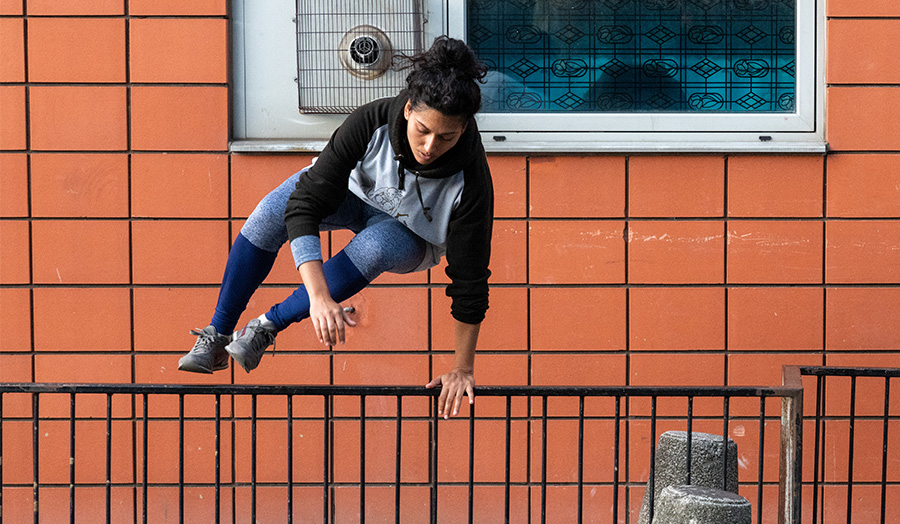Counselling psychology Prof Doc student Kasturi Torchia has developed an unusual sports specialism to support her work into psychosomatic and somatopsychic trauma related psychology: l’art du déplacement or, as it’s more commonly known, Parkour.
What is it about psychology that you enjoy?
Psychology is in everything. I can’t find anything in life that doesn’t require some kind of understanding of another, whether that’s an object or a person – it’s everywhere. I think it’s really important to have an understanding of what brings us together and what separates us, and how we navigate through that – for me, that’s psychology.
And counselling psychology in particular?
Counselling psychology is something that stems from a value system that I am in line with. It has a philosophy underpinning it that is extremely humanistic; it’s person-centred. For me, counselling psychology means moving slightly away from the medical model and staying true to our uniqueness as individuals.
How did this course help you in your workplace?
Doing my master’s and PhD here made me connect with the community a lot more than I would have at a different university. The outreach work I did in my master’s was really helpful and I try to integrate that with the work I do now. The creative projects that I work on are only possible because of the systematic understanding I was given from my courses.
My daily life includes management, counselling psychology in terms of practice, therapy delivery and a lot of outreach awareness-raising roles.
More recently I was appointed the mental health lead and duty of care lead for Parkour nationally. I am in charge of a lot of the safeguarding policies and the delivery of good and ethical practice around the UK for Parkour free running. It’s innovative, creative and I get to work with people from so many disciplines – it’s invigorating and the fact that my tutor supported my research has allowed me to do this. It’s exciting day to day, it’s overwhelming... but also really cool.
Why did you choose to study at London Met rather than another university?
London Met provides a diversity that is quite unique. There’s a nice eclectic community – there are people from all walks of life. You learn more in and around the University than just from your classes. I admire London Met.
Looking back, why are you glad you chose London Met?
I think I didn’t realise when I started how maverick or different what I was going to research was. I think you need a lot of resilience and to believe in yourself to be able to continue on a path like that. This sounds very much like something you’d read on a carton, but actually London Met helped shape that because it wasn’t an easy course. We had to work hard to build rapport. That initiative and that autonomy within my study were really helpful – it allowed me to sit in board meetings with people who would have intimidated me if I hadn’t done the course.
I would not be where I am if I hadn’t done this course at London Met. The University allowed me to be me and that’s pretty cool.
I found a home here and they accepted me from the interview process all the way to the end. This course changed my life and it allowed me to lead the life I wanted to. Not a lot of people can say that with certainty.

